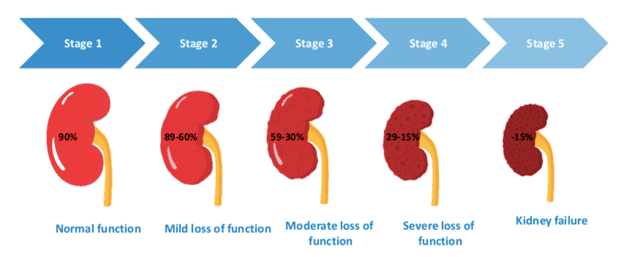Introduction
Chronic Kidney Disease (CKD) is when the kidney gets damaged and fails to function in blood filtration throughout the body. The major and essential function of the kidney is eliminating the extra waste and water from the body to form urine.
The kidney eliminates toxins, waste, and extra water from the body and maintains the equilibrium of salts and minerals, generates hormones that regulate blood pressure, form red blood cells, and keep bones strengthened.
Generally, people with type 2 diabetes, heart disease, high blood pressure, or a family history of kidney disease are more prone to develop chronic kidney disease.
Chronic Kidney disease includes five stages. Early identification of CKD will prevent kidney function & slow progression to the last stages. This article will explain stage 3 chronic kidney disease and related aspects.

Stages of Chronic Kidney Disease
As stated above, CKD includes five stages. From stage 1 to stage 3, the early stages, the kidneys can still eliminate the harmful waste and other toxins from the blood. In later stages, i.e., stages 4 and 5, the kidneys have to work much harder to filter the waste.
Each chronic kidney disease stage is based on the estimated glomerular filtration rate (eGFR) test results. The kidney contains small filters known as glomeruli that assist in removing excess waste and water from the blood.
This eGFR test is a blood test that determines how well kidneys are performing. GFR is an estimate or an indicator of how much volume (of blood) the kidneys can strongly filter per minute.
It is measured by calculating individual waste particles in the bloodstream. The most frequently used one is creatinine( not to be confused with creatine). The higher level of creatinine in the blood, the more likely that the kidney’s ability to function filtration becomes impaired
1. Stage 1: eGFR is 90 or higher
2. Stage 2: eGFR is 60-89
3. Stage 3a: eGFR is 45-59
4. Stage 3b: eGFR is 30-44
5. Stage 4: eGFR is 15-29
6. Stage 5: eGFR is less than 15
Stage 3 chronic kidney disease experiences mild to moderate damage
Often most people find they have chronic kidney disease when they reach the third stage and experience signs of the disease.
In this stage, kidneys become weak, and they lose their ability to filter waste and fluid out from the blood properly. This accumulated waste may further affect your whole body and cause several health concerns such as anemia, high blood pressure, and bone problems.
When your kidneys have been damaged but still function well enough, you don’t require transplantation or dialysis. In stage 3, damage to the kidneys can’t become irreversible. However, with proper treatment and lifestyle changes, one will not move to stage 4 or Stage 5, kidney failure.

Symptoms of Chronic Kidney Disease
Here are some of the symptoms of stage 3 chronic kidney disease:
- Swelling and pain in the hands and feet
- Dry or itchy skin
- Pain in the lower back
- Difficulty in sleeping
- Muscle cramps
- Fatigue or feeling weak and tired.
- Urinating more and or less than normal
- Darker or foamy than normal urine.
- Restless leg syndrome makes a person uncomfortable feeling in the legs that makes it hard to sleep or sit still.
How to Prevent CKD?
Though kidney disease is irreversible, it and get prevented before it gets too late; even if you are following any symptoms, you can follow a prescribed treatment plan to slow or stop the increase of the disease. Here are some precautions you can take for stage 3 chronic kidney disease.

Diet for CKD
Bringing changes to your diet can assist you in living well with chronic kidney disease. Such modifications will help in managing the disease and prevent further damage to the kidneys:
1. Choose Protein wisely: When you are a CKD patient, consuming protein in limited portions or proper serving sizes is advised. Eating more protein than you require can force the kidneys to work harder.
2. Limit sodium intake: Consume food that contains less salt (sodium). Avoid consuming packaged and prepared food, as they have high sodium levels. Prefer consuming fresh food that is made from scratch. Always look for “low salt,” “low sodium,” “unsalted,” or “lightly salted.”
3. Consume heart-healthy food: Add fruits, vegetables, fish, low-fat dairy, lean meats, and poultry without skin to your diet. Avoid fried food and prefer baked or grilled options. Restrict trans & saturated fats.
Lifestyle recommendations
Lifestyle changes can improve your overall health and aid in CKD development.
- Avoid/Quit smoking, alcohol, and drugs.
- Manage stress or anxiety through yoga and meditation.
- Getting proper sleep.
- Practicing exercise and yoga daily.
Ayurvedic Treatment of Stage 3 CKD
Ayurvedic remedies are the best panacea to all chronic and serious problems. When treating stage 3 chronic kidney disease, you must see effective ayurvedic treatments and 100% natural. Though, if you are seeking ayurvedic remedies for the treatment, it is suggested that you are required to consult your doctor.
1. Triphala: It combines three vital rejuvenating sages (herbs). Triphala helps in increasing the natural function of the kidney. It strengthens the kidney and liver both.

2. Ginger: Ginger is the best ginseng ever. It has anti-inflammatory & antioxidant properties that help the kidney perform well and flushes harmful toxins and waste out of the body. Also, it helps reduce pain and swelling caused by infections.

3. Coriander: Coriander is a medicinal herb with a cooling and refreshing taste. Often used in preparing and garnishing the dishes.

4. Gokshura: The bark of the gokshura tree is a great medicinal herb for treating urinary tract infections and burning sensations in urine. It ensures proper flow, and it has been used for ages to eradicate kidney stones.

5. Guduchi: It is the most excellent herb that helps treat urinary problems. People who may find difficulty passing urine can use Guduchi but consult before consuming Guduchi.

6. Turmeric: Renal failure, low urine volume, and common infections can be healed with turmeric. Turmeric is an exceptional less heating spice or herb that helps to reduce inflammation caused due to infection, swelling, etc. It also heals and prevents the formation of kidney cysts.

7. Punarnava: Punarnava is a natural stimulant determined in Ayurveda for micturition and other urinary problems. It also has anti-inflammatory and restoring properties. Punarnava can be used daily to keep the kidney performing healthily.

Conclusion:-
Stage 3 kidney disease is a middle stage of the disease and is related to fatigue and fluid retention symptoms. Most people are unaware of stage 3 kidney disease until they feel symptoms. The life expectancy of a stage 3 kidney patient determines by age at diagnosis and how damaged the kidneys are. Older people can expect a near-normal life expectancy, while younger people with more kidney damage can expect a notably lower life expectancy. However, if one remains serious about changing diet and lifestyle patterns, you do not have to face more stages in the kidney. This disease is curable and can only be treated if consuming the following diet, lifestyle, and ayurvedic medicines for kidney prescribed by the doctor.

